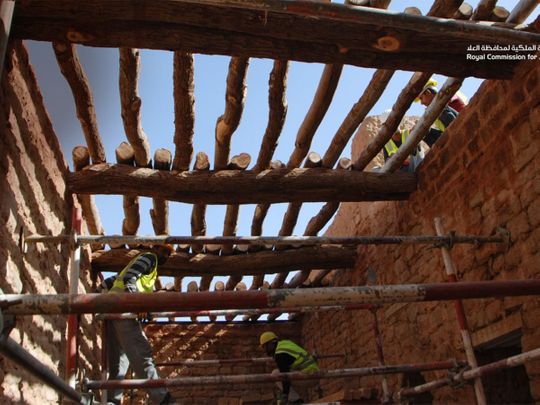
Abu Dhabi: The Royal Commission for Al Ula Governorate announced the completion of the restoration of the Al Zawiya and Hamad Bin Yunis mosques in the Old City of Al Ula, in north-western Saudi Arabia, Saudi media reported.
Residents of Al Ula, cradled in a spectacular valley with palm groves running through its center and sandstone cliffs surrounding it, took part in the restoration, including strengthening the structure of the two mosques, reducing the wear that they suffered over time and rebuilding ceilings, walls and floors using locally sourced materials compatible with the urban identity of Al Ula Heritage Town, an area of the size of Belgium.
The rehabilitation work was carried out through a partnership between the Royal Commission for Al Ula governorate, the programme for the reconstruction of historical mosques adopted by the Heritage Authority and the Ministry of Islamic Affairs. This partnership is part of the Royal Commission’s great interest in preserving the historical heritage of Al Ula province and all Government programmes and projects concerned with the kingdom’s heritage.
The restoration work is part of an expanded project implemented by the Royal Commission for the Governorate of Al Ula with the aim of developing historical mosques in the Old City.
The project reflects the authority’s commitment to protecting the historical heritage in Al Ula, and falls within the framework of Al Ula vision of making it a global destination for sustainable historical culture and tourism, which will position Saudi Arabia as a more popular destination for tourism and is among a crop of entertainment and travel-inspired projects in the kingdom.
Dr. Abdul Rahman Al Suhaibani, Advisor of Antiquities and Heritage at the Royal Commission for the Governorate of Al Ula said, “The project reflects the commitment of the authority to protect human heritage in Al Ula, because of the benefit to the people of Al Ula and visitors alike. The two mosques have a distinguished history and enjoy a great status in the hearts of the people of Al Ula, where their efforts throughout history helped maintain and preserve them, so that we can today restore them again and recover their historical status in the Al Ula community, so that they continue to receive worshipers and tourists interested in Islamic architecture.”
The consultant of the restoration company, Abdul Rahman Al Imam, revealed how a plan for restoration was put in place to preserve the existing status of the mosque, support the parts that needed to be strengthened and rebuild the destroyed parts in the old style using locally sourced material.
“We relied on information collected from senior citizens, about the shape of some of the destroyed parts, and the building materials of Al Ula, including natural clay, the wood of Al Ula and the trunks and palm trees that are widely used in the building in the old town,” Al Imam said.








